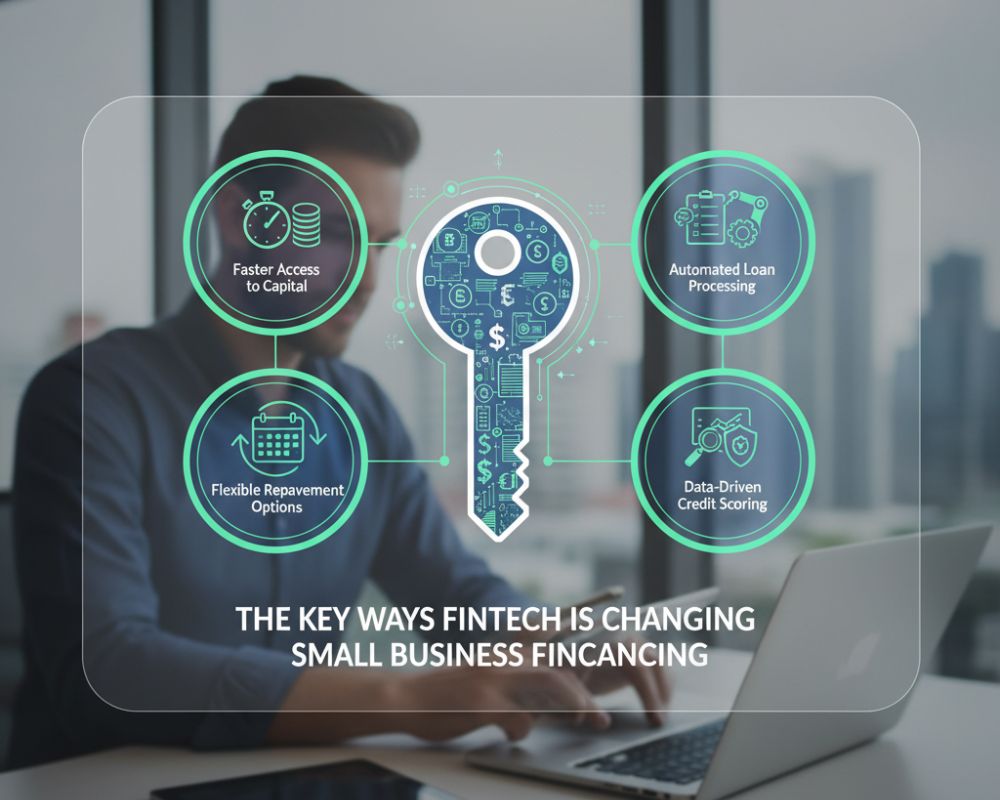For many years, getting funding for a small business was slow and stressful. Business owners had to visit traditional banks, fill out long forms, and wait weeks for approval. Even then, many were rejected because they did not meet strict requirements. This old system made small business financing difficult and limited growth for many entrepreneurs.
Today, this situation is changing fast because of Fintech innovation. Financial technology is transforming how businesses access capital. Through digital lending platforms, online business loans, and alternative financing solutions, small businesses can now get funding faster and with fewer barriers. Fintech uses AI-powered credit assessment, real-time data, and automation to make lending more flexible and accessible.
In this guide, you will learn how Fintech is revolutionizing small business financing. We will explore alternative lending options, the benefits of Fintech loans for small businesses, and how modern digital financial services help businesses grow. You’ll also discover what to look for in a Fintech lender and how to choose the right small business funding solution for your needs.
What Is Fintech?
Fintech (short for financial technology) refers to the use of modern technology to improve and automate financial services. It includes tools, platforms, and software that make financial processes faster, smarter, and more accessible. In recent years, fintech solutions for small businesses have grown rapidly and changed how companies manage money.
For small businesses, fintech is most visible in digital lending platforms, online business loans, and alternative financing options. These tools remove many of the delays and complications found in traditional banking. Instead of paperwork and long approval times, fintech uses automation, cloud-based systems, and AI-powered decision-making to deliver faster results.
Fintech also supports cash flow management, payment processing, and business financial management. This makes it easier for entrepreneurs to focus on growth instead of struggling with outdated financial systems. In simple terms, fintech helps small businesses access money and manage finances in a more modern way.
Why Fintech Matters for Small Businesses

Fintech matters because it solves many problems that small businesses face with traditional banks. Banks often demand long business histories, strong credit scores, and physical collateral. Many small businesses cannot meet these strict rules. The Fintech Industry takes a more flexible and modern approach to small business financing.
Instead of depending only on credit scores, fintech lenders use data analytics, real-time financial data, and automated risk assessment. They can review daily sales, digital payment records, accounting software data, online reviews, and e-commerce performance. This gives a clearer and more accurate view of a business’s financial health and cash flow.
Because of this, fintech opens doors to alternative lending, fast business loans, and working capital financing. These options are often quicker, more transparent, and easier to access than traditional bank loans. For growing businesses, fintech funding means faster access to capital, improved cash flow management, and more chances to scale without unnecessary delays.
The Key Ways Fintech Is Changing Small Business Financing

The shift from traditional banking to Fintech-driven alternative lending is not just about speed; it’s a fundamental change in how financing works. Here are the main ways this revolution is helping small businesses.
1. Faster Access to Capital
One of the most significant advantages of Fintech lending is the speed of the application and approval process. Many online lenders offer simple applications that can be completed in minutes. Because they use automated algorithms for underwriting, decisions can often be made within hours, not weeks. For a business needing to purchase inventory quickly or cover an unexpected expense, this rapid access to funds can be a game-changer.
2. Increased Approval Rates
Traditional banks are often risk-averse and tend to decline a high percentage of small business loan applications, especially for new businesses or those with less-than-perfect credit. Fintech lenders, with their advanced data models, are often more willing to fund businesses that banks might overlook. By analyzing real-time cash flow and other non-traditional metrics, they can approve loans for a broader range of entrepreneurs.
3. More Flexible and Diverse Loan Products
Fintech has introduced a variety of alternative lending options that go beyond the standard term loan. These products are designed to meet specific business needs:
- Invoice Financing: Receive an advance on your unpaid invoices to enhance your cash flow while you wait for clients to settle their accounts.
- Merchant Cash Advances: Receive a lump-sum payment in exchange for a percentage of your future credit card sales. Repayments are flexible, rising and falling with your sales volume.
- Lines of Credit: Access a flexible pool of funds that you can draw from as needed, only paying interest on the amount you use. This is ideal for managing ongoing operational costs.
- Crowdfunding Platforms: Raise capital from a large number of individuals online, who might receive equity, rewards, or simply donate to support your vision.
4. A Better Customer Experience
Fintech companies are built on technology, which usually translates to a seamless and user-friendly digital experience. From intuitive online application portals to transparent dashboards that allow you to track your loan status and payments, the entire process is designed for convenience. This customer-centric approach stands in stark contrast to the often-cumbersome processes associated with traditional lending.
Choosing the Right Fintech Financing Partner

With so many Fintech lenders and alternative business financing options available, choosing the right partner is critical for your long-term success. Not all digital lending platforms are the same, and the wrong choice can lead to higher costs or unnecessary stress. Before committing to any small business loan, take time to evaluate these key factors carefully.
Interest Rates and Fees
Always understand the total cost of financing, not just the advertised interest rate. Many online business lenders charge additional costs such as origination fees, processing fees, or early repayment penalties. Ask for a clear breakdown of all charges so you know exactly how much you will repay over time. Transparent pricing is a strong sign of a trustworthy Fintech loan provider.
Reputation and Customer Reviews
Research the lender’s reputation before applying. Look for reviews from other small business owners who have used the same Fintech financing solution. Pay attention to feedback about customer support, repayment flexibility, and problem resolution. A lender with strong reviews usually offers better customer experience and long-term reliability.
Transparency and Loan Terms
A reliable Fintech financing partner will clearly explain loan terms, repayment schedules, and conditions. There should be no confusing language or hidden clauses. If a lender avoids direct answers or buries important details in fine print, consider it a red flag. Clear communication is essential for building trust in business funding solutions.
Eligibility Requirements
Each Fintech lending platform has different eligibility criteria. Some focus on cash flow-based lending, while others consider credit scores, monthly revenue, or business performance data. Review these requirements before applying to avoid unnecessary rejections or credit checks. This saves time and helps you find a small business financing option that fits your situation.
Speed and Funding Flexibility
One of the biggest advantages of Fintech business loans is speed. Check how quickly funds are approved and deposited. Also, consider whether the lender offers flexible repayment terms that align with your cash flow. Fast access to capital with flexible terms can make a big difference for growing businesses.
The Future of Small Business Financing
FAQs
Is Fintech lending safe for small businesses?
Yes, for the most part. Reputable Fintech lenders are regulated and use secure technology to protect your data. However, as with any financial service, it’s crucial to do your research. Stick to well-known platforms and be wary of offers that seem too good to be true.
Can I obtain fintech financing with a poor credit score?
It’s possible. While credit scores are still a factor, many Fintech lenders place more emphasis on your business’s recent performance and cash flow. If you have strong revenue, you may qualify for financing even with a lower personal credit score.
What is the difference between alternative lending and traditional lending?
The main differences are the source of funds, the application process, and the underwriting criteria. Traditional lending typically originates from established banks, which have strict and lengthy processes. Alternative lending is offered by non-bank lenders, often operating online, who utilize technology to provide faster and more flexible financing solutions based on a broader range of data.
Does Fintech financing work for new or small startups?
Yes. Many Fintech lending platforms support startups and early-stage businesses. Instead of long credit history, they focus on cash flow data, digital sales records, and overall business performance. This makes alternative business financing more accessible for new entrepreneurs.
Are Fintech loans better than traditional bank loans?
Fintech loans are not always better, but they are often faster and more flexible. Traditional bank loans may offer lower interest rates, but they come with strict rules and slow approvals. Fintech business loans provide quicker access to capital, easier applications, and flexible repayment, which is ideal for growing small businesses.








Who is First Digital Finance Corporation?
Biometric Authentication: The Future of Banking Security
What is a Fintech Firm? Everything You Need to Know
Open Banking Revolution: Transforming Digital Finance and Empowering Consumers
Digital Twin Technology in Finance: How Virtual Models Are Transforming Risk Management
The Future of Personal Finance: Autonomous Finance and AI Money Management
AI Credit Scoring: Revolutionizing SME Banking and Digital Loans
AI Fraud Detection: How Banks Prevent Financial Crime in Real Time